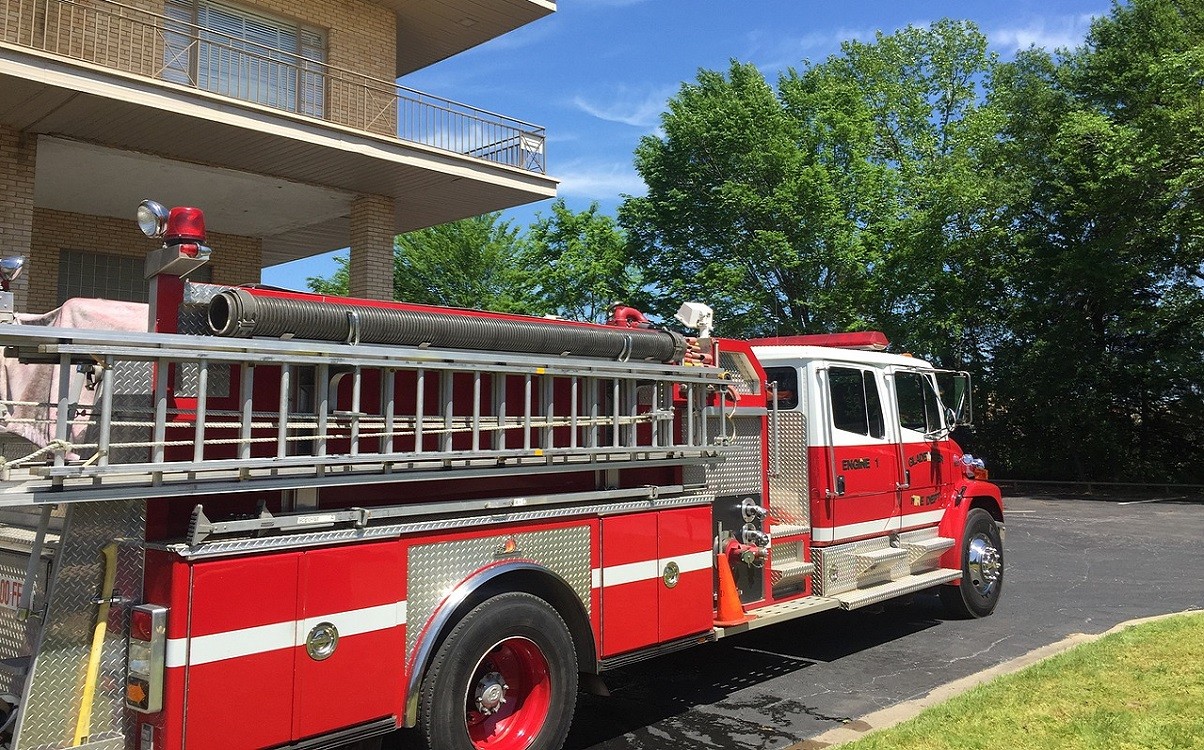Injured Firefighter’s 20-year Fight
- Anne Thompson
- Canada
- COVID-19
- Op-Ed
- Western Canada
- Women's Rights
- April 27, 2020

Moving Out Of Your Community Is Painful: Injured Firefighter’s 20yr Fight with WCB
“I remember it was before my guts exploded – after being on fentanyl for 7 months – was around the time I received the . . . letter.” Anne Thompson
“I got your six,” I’d like to say to all volunteer emergency service workers.
I am going through a really painfully tough time now. When I see headlines in print, online, and televised of people loudly and colourfully demonstrating their support especially of volunteer front-line workers all I can ask myself is, “Do they know the downfall they face should their body become permanently damaged?”
My husband and I moved our family to a small community for the lifestyle and to allow the children to experience the neighbourliness of small towns. Besides our home, we had a small acreage we were slowly developing for retirement. Since moving to the community in June of 1998, I began volunteering as a firefighter with The Rural Municipality and Town of Birtle Fire Department as well as volunteering as ambulance attendant with Birtle Ambulance.
In June 2000, while performing assigned duties as a firefighter, this body was traumatically damaged in a fall resulting in the loss of about an inch in height on one side when the heel bone burst and shattered on impact – a severely comminuted fracture of the right calcaneus.

The medical care was the best. The end result is a markedly deformed heel with an associated degeneration of the surrounding bones and ongoing heel pain. I use elbow crutches and a wheelchair, but at times crawl to get around.
As I was a volunteer firefighter at the time of the incident and was not earning a wage, I was told that according to the regulations of the Agent I am not entitled to funds for retraining or further education in any other field that could accommodate my current physical limitations. The injury has made me incapable of accepting any position for which I was trained: not as a Power Engineer Third Class, Level 1 firefighter, nor ambulance attendant.
It was not the injury that ended my bucolic life. No. It was the words with their implied threat, and the perceived attitude behind the words in a letter from an Agent of the Government of Manitoba that changed my life and sent me on my quest.
I felt threatened when a letter arrived telling me, in bold font, that “failure to comply with our relocation policy will result in wage replacement benefit reduction.” I thought this unjust and comparable to a form of blackmail. I believe it has implications for any other workers, wage earners, or volunteers, who, if they have tried to accommodate the Agent in seeking employment and are not successful in their attempts in their own community, must move to a larger community not of their choosing.

Another letter from the Agent stated, “According to this policy (40.20.40), a worker is protected to stay in their community if they so choose providing they have an attachment such as long-term ties to the community.”
Please be aware that I had been in my chosen community for only about two years at the time of the incident and was involved in Communities in Bloom, the Fire Department, Birtle United Church activities, Birtle Ambulance, and the Birtle Collegiate Institute, among activities. “We are not forcing Anne to relocate,” stated another yet letter, “but have advised her that if she chooses not to, her benefits would be reduced…”
I quickly enlisted the assistance of Mayor Ron Bell, the Reeve, and Fire Chief Kevin Hickman (who still lives there) in a letter-writing campaign in my attempts to get the Agent to rescind their action. I believe requiring workers to leave their chosen community for larger urban centres has the potential to destroy small communities that are fighting to survive. The community’s tax base will diminish, and the small shop owners who depend on local commerce to survive will also suffer – and may be the last straw for their survival.
Some time shortly thereafter, I received written notification that this order had been put into “abeyance”. When I contacted the liaison between the Government of Manitoba and the Agent, I asked if the Agent could activate the order at any date in the future. I was told, “Yes.” I then asked if this meant that I “still have an axe hanging over my head”, and again I was told, “Yes.” I consider myself still under the threat of the whim of an unknown human as this order has never been rescinded.
In my search for justice and legal assistance to assist in my quest to help others stay in the community of their choice, and in rectifying what I consider to be a threat to small communities, I moved to Winnipeg in February of 2005 to be closer to the hearts of both the political and the court systems.
Really, it really all boils down to my belief system. I truly believe an Agent of the Government of Manitoba, as representative of the Crown, has not the right to determine where a Canadian can or cannot domicile, insofar as the place where one is deemed to have one’s permanent home, unless it comports with the basic principles that underlie our notions of justice and fair process.
[Especially since it was done under the pretext of being better to assist me — but that’s for another long letter.] That, and “Any infringement of the right to life, liberty and security of the person must comport with the principles of fundamental justice.” R. v. Morgentaler, 1988 CanLII (SCC), [1988] 1 SCR 30.
I also believe the criminal law limitation period does not benefit Agents who commit an offence that’s classified as indictable! Under section 346 (1) of the Criminal Code of Canada, “Every one commits extortion who, without reasonable justification or excuse and with intent to obtain anything, by threats, accusations, menaces or violence induces or attempts to induce any person, whether or not he is the person threatened, accused or menaced or to whom violence is shown, to do anything or cause anything to be done.”
So strongly do I believe the words in the Canadian Charter of Rights and Freedoms, that I crawled to the Manitoba Legislature on June 2nd, 2005 to read to the Members of the Legislative Assembly gathered in Room 254 my letter explaining what an Agent was ordering me to do, and of the negative impacts this behaviour has on rural communities believing wholeheartedly that all I had to do was to tell them and they would then just fall over backwards to make it right.

I honestly thought it was a simple case of administrative mismanagement because the Ministers and the other MLAs gathered there just were not aware of what was happening on the ground nor of what were the real-world consequences of the behaviour of the Agent as seen through enactment of their policies and procedures. Can you imagine Anybody so stupid?!
I have not ceased in my attempts to hold the Agent accountable for the actions taken.
I have lost the support of my friends, neighbours and family members from the small community of which I used to belong. I do not know whether any of you are cognizant of the warmth and friendliness in a small town, of the willing helping hand one is extended in such a location as compared to the coldness and isolation in city life where I have found most people do not even know their next door neighbour’s name.
In order to complete my quest I believe I must launch a Charter Challenge. I understand that even under Administrative Law, “If citizens feel that an administrative authority has made a decision affecting them that violates a constitutional, statutory or common-law principle, they may ask a court of law to review the actions of the authority.” Yeah, but just try to get in through the door of the court of law!
I do not know whether I read this sentiment or grew up acquiring it from having grown up in Winnipeg, Manitoba, Canada. However it may be, know I take on this quest because I aspire to make positive change in our world through this fearless and ceaseless effort to confront bad public policy and to ask why Canada, one of the richest and best educated countries in the world, cannot do better.
It is my intent to bring a case against a Principal who was negligent in the supervision of their Agent, allowing the Agent to force a person by threat of punitive financial sanction to relocate because this person meets certain criteria regardless and unrelated to this person’s own abilities, priorities, and aspirations which is profound interference and thus an infringement of security of the person.
I would do this myself, as I believe the facts speak for themselves, but I am having trouble finding Somebody to help me correctly complete a Notice of Application, form 14B, under Court of Queen’s Bench Rules 14.05. So far, the letters I’ve received from lawyers either indicate no interest or – get this – that this is ‘beyond their expertise’. I had no idea that getting injured on-the-job would mean I would need a law degree!
If my beliefs are wrong, let a judge tell me so.

I want to be able to tell Everybody and especially all volunteer emergency service workers, “It’s okay. I’ve got your back. I made certain that if you are permanently disabled while on-the-job performing your assigned duties the Agents in charge of your care shall mindful of a standard of duty of care that includes preservation of rights under the Canadian Charter of Rights and Freedoms, and of lawful behaviour when crafting and when implementing their policies.”
Such a quest Nobody in her right mind would take on.
Policy 44.120.30, Support for Daily Living. This policy allows injured workers up to six months of financial assistance to a maximum rate. From a letter authored by John Gray, Review Officer, dated December 6, 2004, “Whether after six months the injured worker is capable of performing the activities of daily living is not germane. Entitlement ends at that time.” And, “it is considered that the fact that the worker cannot perform the activities [of daily living] do not meet this test. If the policy were intended to provide such assistance for as long as the worker could not perform the activities [of daily living, like fixing food or getting dressed], it would have stated that. It most emphatically does not.” I contend it most emphatically should.
I believe my children ought not to be made to take on the role of primary caregiver at the age of 12 and 15 years old. They must also be given the chance to develop their own talents with participation in after-school activities, cadets, guides, scouts, a part-time job, other community volunteer activities. I have lost the support of my friends, neighbours and family members from the small community I used to belong to. I do not know whether any of you are cognizant of the warmth and friendliness in a small town, of the willing helping hand one is extended in such a location as compared to the coldness and isolation in city life where I have found most people do not even know their next door neighbour’s name.
Be aware that I have been told, on at least three separate occasions, by two of the Agent’s employees, that the Agent is only concerned about claimants between the hours of nine and five, that they have neither concern nor care about what happens to the worker nor how much difficulty a worker might be experiencing outside work hours.
Anne Thompson
Opinion Piece
Twitter.com/spiritual_anne
You May Also Like
What Is The Definition Of Poverty? How Should It Be Defined In 2020?








